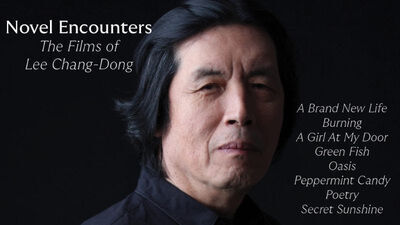
Lee may be best known in the United States for his latest film, “Burning” (2018), an adaptation of a Haruki Murakami short story called “Barn Burning” that is itself a riff on a William Faulkner short story also called “Barn Burning.” Starring Yoo Ah-in as listless loner Lee Jong-su, in love with lissome dreamer Hae-mi (Jeon Jong-seo) who seems herself to be in love with the mysterious, enigmatic Ben (Steven Yeun) whom she has discovered on a trip somewhere and who now accompanies her everywhere she goes. When they first meet, Jong-su and Ben, Ben’s reading a collection of Faulkner short stories and telling Jong-su that he doesn’t experience pleasure except through the agency of others. He is detached. He has been made strange by experience and longing. Everyone has, burning away in our separate places as time ticks down to nothing. Lee’s adaptation takes in all of its literary sources and adds a dash of jazz (acknowledgement of Murakami’s predilection for dropping references to his vast music library into his work), along with long considerations of an inscrutable natural world in reference to Faulkner. It is languorous in peeling back the layers of delusion swaddling his lost boys and girls. Lee’s films aren’t concerned with failed ambition but rather with the fruitlessness of any ambition. His characters want things but don’t have the means to attain them. Hae-mi remembers a time as a child someone told her she was ugly and she carries it with her through all of her life until the moment she disappears without even a ripple to mark where she slid beneath our notice.

I like to think Hae-mi vanishes from this film to become, anachronistically, Lee Shin-ae (Jeon Do-yeon) of Lee Chang-dong’s “Secret Sunshine” (1999), a film that precedes “Burning” by almost a decade. Shin-ae is a young widow who moves to the town of Miyang to try to escape her grief with her little boy, but then her boy disappears, too, a victim of a kidnapping gone badly wrong. The entire film is focused on Shin-ae’s unmanageable grief: her fits of howling madness triggered by nothing, her intense confession to a pharmacist that “there’s something wrong with me, you know, I have butterflies inside me” in another line that sounds very much like a phrase from Faulkner; her rage against every kind of organized religious ritual and invitation to process her grief through platitudes and other cold comfort. She is mercurial. Her grief makes her that way. Grief makes everyone that way. Lee follows her dispassionately as she staggers into traffic, into and out of various trials physical and emotional, finally into the orbit of people who would love her if she had love left. He doesn’t turn her pain into a process of cleansing and rebirth, but of a continual spiritual emptying unto the vacuum of black despair. It’s not unlike Lars Von Trier’s “Breaking the Waves” (1996) in how it expresses, somehow, kindness through its unfiltered cruelty or like Kafka’s short story “The Hunger Artist” who protests he would eat if only he found anything he wanted to eat. Lee challenges empathy for the lost. He asks of it from us for the most desperate, pathetic, insinuating, and grasping. What good is grace if it’s not offered to the irredeemably broken?

That’s how we find aging Mija (Yun Jung-hee) of Lee’s “Poetry” (2010) who, tasked as the sole caregiver for a troubled, and criminal teen, is given a diagnosis of dementia the same day she has reason to believe her ward has been involved in the sexual assault and suicide of a young girl. She doesn’t tell anyone: her estranged daughter, the old man who has a crush on her, no one. Lee’s films are all about how we choke down our disappointments and horrors, pack them into our consciousness in the hopes the poison of them doesn’t make it impossible to seed the earth above it. Mija takes a poetry class at the local community center and begins to take notice in the minute details of the nature around her. In the whorls and secret spaces of flowers, she finds a secret place to explore while the world around her burns to cinder and ash. I equate this film most closely in Lee’s filmography with his “Oasis” (2002), an unlikely romantic comedy involving a recently-released ex-con and a woman severely afflicted by cerebral palsy who is the daughter of the man our hero killed in a hit-and-run, thus landing him behind bars in the first place. It’s a story of two people, shunned by their families and society: one for the carelessness of his actions and the other by circumstance beyond her control, but both joined by their grief over the things they’ve lost, however they’ve lost them. Forced to turn inwards by the coldness of a capricious universe, they retreat into light magical realism and the fantasy that there are happy endings in love stories when love stories by their nature are tragedies. By the end of “Poetry,” Mija has taken on the sins of Man and prepares to expiate them through her own sacrifice: unheralded but free at last.

